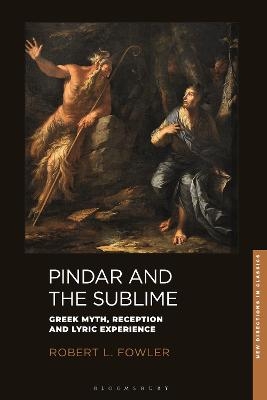
Pindar and the Sublime
Greek Myth, Reception, and Lyric Experience
Seiten
2022
Bloomsbury Academic (Verlag)
978-1-78831-114-4 (ISBN)
Bloomsbury Academic (Verlag)
978-1-78831-114-4 (ISBN)
The best of Greek lyric poetry pushes at the very limits of what is possible with language and meaning.
Pindar—the ‘Theban eagle’, as Thomas Gray famously called him—has often been taken as the archetype of the sublime poet: soaring into the heavens on wings of language and inspired by visions of eternity. In this much-anticipated new study, Robert Fowler asks in what ways the concept of the sublime can still guide a reading of the greatest of the Greek lyric poets. Working with ancient and modern treatments of the topic, especially the poetry and writings of Friedrich Hölderlin (1770–1843), arguably Pindar’s greatest modern reader, he develops the case for an aesthetic appreciation of Pindar’s odes as literature.
Building on recent trends in criticism, he shifts the focus away from the first performance and the orality of Greek culture to reception and the experience of Pindar’s odes as text. This change of emphasis yields a fresh discussion of many facets of Pindar’s astonishing art, including the relation of the poems to their occasions, performativity, the poet’s persona, his imagery, and his myths. Consideration of Pindar’s views on divinity, transcendence, time, and the limits of language reveals him to be not only a great writer but a great thinker.
Pindar—the ‘Theban eagle’, as Thomas Gray famously called him—has often been taken as the archetype of the sublime poet: soaring into the heavens on wings of language and inspired by visions of eternity. In this much-anticipated new study, Robert Fowler asks in what ways the concept of the sublime can still guide a reading of the greatest of the Greek lyric poets. Working with ancient and modern treatments of the topic, especially the poetry and writings of Friedrich Hölderlin (1770–1843), arguably Pindar’s greatest modern reader, he develops the case for an aesthetic appreciation of Pindar’s odes as literature.
Building on recent trends in criticism, he shifts the focus away from the first performance and the orality of Greek culture to reception and the experience of Pindar’s odes as text. This change of emphasis yields a fresh discussion of many facets of Pindar’s astonishing art, including the relation of the poems to their occasions, performativity, the poet’s persona, his imagery, and his myths. Consideration of Pindar’s views on divinity, transcendence, time, and the limits of language reveals him to be not only a great writer but a great thinker.
Robert L. Fowler is Wills Professor of Greek Emeritus at the University of Bristol, UK. He is the author of The Nature of Early Greek Lyric: Three Preliminary Studies (1987) and Early Greek Mythography (2 volumes, 2000-2013). He has published widely on Greek poetry, mythology, historiography, reception and the history of Classical scholarship. He is a Fellow of the British Academy.
Acknowledgements
Preface
Ch. 1: Sublime Receptions
Ch. 2: Shared Experience
Ch. 3: Exceeding Limits
Epilogue
Notes
Bibliography
Index of Passages
Index of Names and Subject
General Index
| Erscheinungsdatum | 02.09.2019 |
|---|---|
| Reihe/Serie | New Directions in Classics |
| Zusatzinfo | 25 bw illus |
| Verlagsort | London |
| Sprache | englisch |
| Maße | 156 x 234 mm |
| Gewicht | 567 g |
| Themenwelt | Geisteswissenschaften ► Philosophie ► Philosophie Altertum / Antike |
| Geisteswissenschaften ► Sprach- / Literaturwissenschaft ► Anglistik / Amerikanistik | |
| Geisteswissenschaften ► Sprach- / Literaturwissenschaft ► Literaturwissenschaft | |
| Sozialwissenschaften | |
| Weitere Fachgebiete ► Sportwissenschaft | |
| ISBN-10 | 1-78831-114-0 / 1788311140 |
| ISBN-13 | 978-1-78831-114-4 / 9781788311144 |
| Zustand | Neuware |
| Haben Sie eine Frage zum Produkt? |
Mehr entdecken
aus dem Bereich
aus dem Bereich
mit Sokrates, Seneca, Platon & Co. im Gespräch
Buch | Hardcover (2023)
FinanzBuch Verlag
18,00 €


